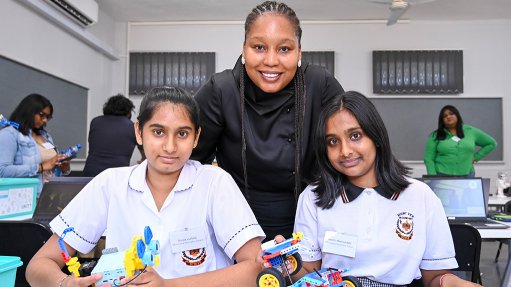
Maude Modise standing alongside two students
As part of the first phase of a programme to provide technology support for various schools around South Africa, the Shoprite Foundation launched two fully equipped robotics laboratories at the Mountview and Verulam high schools, in KwaZulu-Natal, on January 31.
The foundation invested R1.6-million in robotics infrastructure, equipment, course work and teaching for the two labs.
“Shoprite Checkers has come to our aid or support in view of the current curriculum offered at the school . . . Robotics…. is the future and skilling learners with this kind of technology for the Fourth Industrial Revolution is something that is important,” expressed Mountview High School principal Indran Govender during a panel discussion at the launch.
Shoprite Foundation managing trustee Maude Modise said the two schools were selected to launch the robotics initiative as the Department of Education pilots coding and robotics as a school subject.
“The groundwork was in place and, importantly, there was interest and enthusiasm, so we saw an opportunity to help by providing training and equipment and adapting the existing computer rooms into fully functional robotics laboratories,” she added.
The foundation commissioned Sifiso Edtech – a local company specialising in delivering turnkey robotics hubs – to provide the necessary infrastructure, robotics kits, teaching materials and training.
The kits come with over ten models each and include components such as microcontrollers, actuators and gyroscopes. The kits are modular, allowing learners to create their own builds.
In-person and online training for teachers, as well as lesson plans, presentations and worksheets, are also provided.
“There's a whole ecosystem around coding and robotics and we make sure that we connect teachers from around the whole country,” said Sifiso Edtech head of digital learning and technology Xoliswa Mahlangu.
Durban University of Technology mechatronic engineering lecturer Tyrone Bright noted during the panel discussion that robotics education could also assist with building pupils’ problem-solving skills.
“That’s what something like this does. It develops those fundamental skills that students need when it comes to . . . living in the real world . . . and working in industry . . . and that's why it's so important,” he said.
“Giving students access to all those resources with the lab can really change the face of the world,” added Mahlangu.
In addition to funding the laboratory setup, kits and teaching aids, the Shoprite Foundation also donated laptop computers and tablets to the two schools.
“[Artificial intelligence (AI)] is already part of our everyday lives. At the Shoprite Group, we’re using AI to get the freshest products on the shelves and reduce food waste. By investing in future-fit education, we aim to ensure that these learners leave school able to participate and continue in a modern economy,” Modise commented.
While robotics may currently be the “cutting edge of maths and science education”, she noted that the group’s efforts to unlock educational opportunities and encourage entrepreneurship among young South Africans extended beyond this.
Hence, the Shoprite Group has also provided a Consumer Studies laboratory for the Mountview Secondary School – funded by the Shoprite Foundation – to encourage entrepreneurial endeavours among learners. This facility was also launched on January 31.
Govender noted that the new facility could help muster confidence in pupils and help provide them with skills in the culinary field, for example, whereby they could learn to sustain themselves.
“Enabling people to achieve their potential is a powerful thing. It’s not beyond the realms of possibility that someday soon there could be a South African-designed rover on Mars,” expressed Modise.